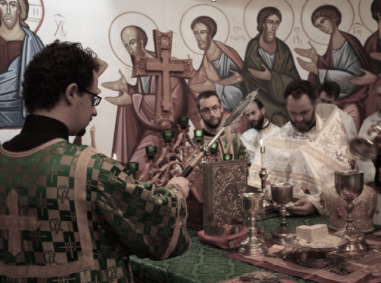One of my favorite days, as a kid, was my birthday. I think every kid on the planet thinks their birthday is one of the best days of the year.
Why?
The presents, of course!
Though the presents were given freely, and out of love, I knew I had an obligation in return: the thank you card.
My mother didn’t let a birthday pass without me thanking everyone. In fact, my grandmother once remarked how impressed she was that my sister and I never failed to write our thank yous.
Though the Divine Liturgy of the Orthodox Church has layers of meaning, one meaning is: thanksgiving!
In fact, “thanksgiving” is what the word “Eucharist” means. When we celebrate the Eucharist, we are, in fact, like a child writing a thank you card to God!
THE BREAD AND WINE REPRESENT US
When people hear the word “Eucharist,” they automatically think of bread and wine – and rightly so.
Bread and wine don’t appear naturally in nature. It’s a lot of work.
The bread goes from wheat, to flour, to the oven, and finally, it can be set on the table.
Making wine is also a process. Grapes are crushed, fermented, aged, and then it’s wine that can be bottled.
What’s the common factor between bread and wine? They are the products of the work of human hands, and as such, they represent us!
WE OFFER OUR LIVES TO GOD AS THANKSGIVING
The bread and wine represent us.
When the priest brings the bread and wine to the altar – in the Great Entrance – he brings us, the people gathered together, to the altar.
We offer ourselves – our lives, our hopes, and our faith – to God. All of this is symbolized by the bread and wine.
We offer ourselves to God as a thanksgiving for the free gift God has given to us: salvation through His Son, Jesus Christ.
GOD ACCEPTS OUR GIFTS AND TRANSFORMS THEM
God accepts our gift and transforms it into the Body and Blood of Jesus Christ.
The Eucharist isn’t just a remembrance of the Last Supper, or a symbol of Christ, but the very Body and Blood of Christ himself!
THIS TRANSFORMATION EVEN TRANSFORMS US
Once God has transformed our gifts, He invites us to come consume this Eucharist.
We are invited forward with these words:
Approach with the fear of God, faith, and love.
Through this Eucharist, we are transformed into the Body of Christ: the Church.
We aren’t just eating bread and wine. Our sins are being forgiven.
We are communing with God.
We are inheriting the Kingdom of God.
We are being saved!
NOW TO CONTINUALLY REMEMBER AND THANK GOD
Building a relationship with someone – a friend, a spouse, a sibling – is a lifelong process, and so is building a relationship with our Lord, Jesus Christ.
Every time we gather to give thanks to God, through the Eucharist, we build our relationship with Him.
Every Sunday we are invited to come, give thanks, and be transformed by the love of God.
Now, it’s up to us to accept God’s invitation.
P.S. WE ARE INVITED EVERY SUNDAY TO BE TRANSFORMED
In the Divine Liturgy the priest says,
Offering to You these gifts from Your own gifts in all and for all…
And the people respond,
We praise You, we bless You, we give thanks to You, and we pray to You, Lord our God.
The Divine Liturgy is an act of thanksgiving, among other things.
We thank Him for giving us life, salvation, and eternal life through Jesus Christ.
I invite all of you to come thank God this Sunday at St. Elias (10:30 am, 2001 Asbury Rd., Dubuque).


Thanks for this post, Fr Dustin. In Western traditions we tend to think first and most about the transformation (or not) of the bread and wine (or not!) into the Body and Blood of Christ. Little or no attention is given to the elements representing us, we who are made into the Body of Christ. I like the way you express this, as it shows the sacrament conveying theosis so vividly.
LikeLike
Hi Gary,
I’m glad you enjoyed it. I think one of the beautiful aspects of the Christian tradition is that there are layers of meanings, which can speak to a variety of people, in a variety of cultures, through various time periods.
LikeLike